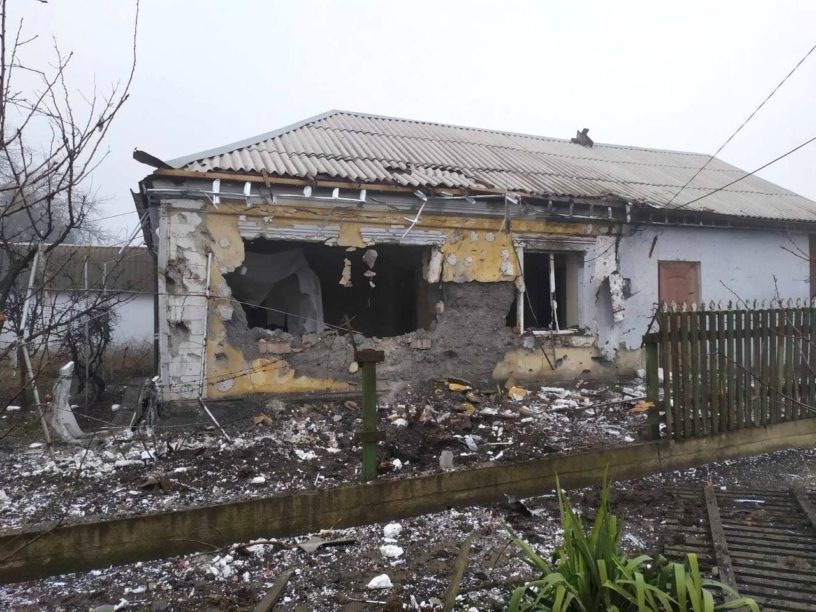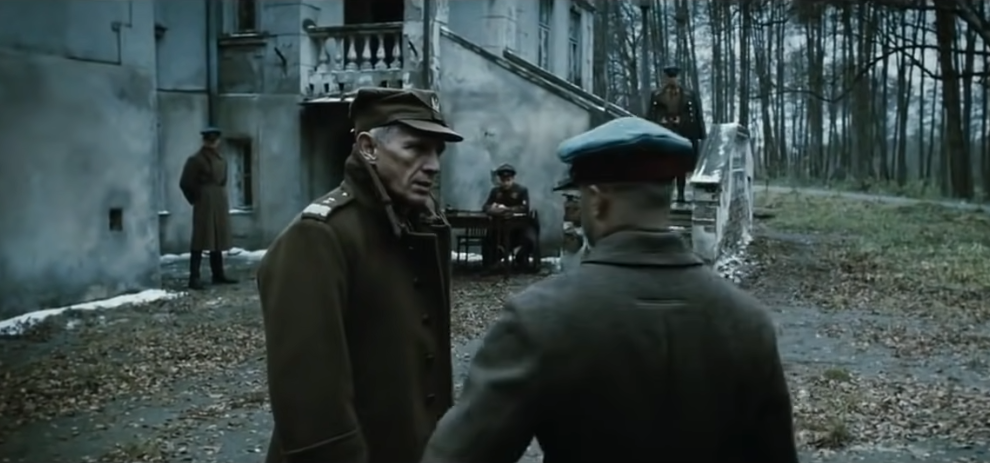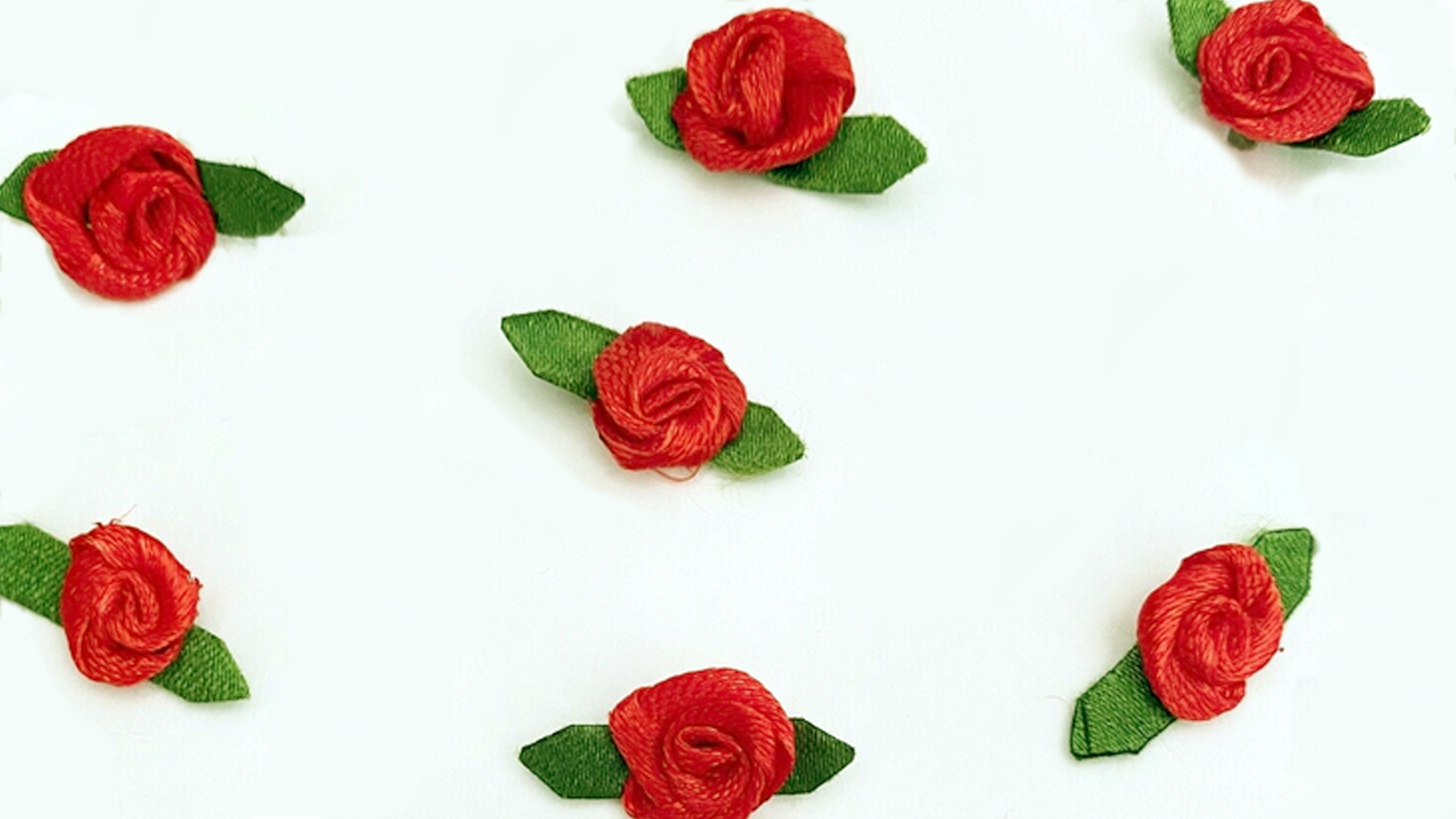He was caught somewhere between his mother's last kiss and the first kiss he would give his child, between the war that was and would be. — Jonathan Safran Foer
During the Cold War, my mother would travel from Gdańsk, Poland, to East Berlin twice a year to shop for items that were unavailable back at home; school supplies, clothes, and food were on her usual list. But when I was seven, she bought for my sister and me one of the rarest items we knew at that age—camisoles. They were white, printed in a pattern of tiny pale red rosebuds, each accompanied by two tiny green leaves. The top of the camisole was adorned with a delicate cotton lace and the spaghetti straps were made of satin that felt cool to the touch of my fingertips. The camisoles came with matching panties. The sets were exquisite.
This assessment, of the exquisiteness of rare new underclothes, came in a cluster of feelings that I could not easily make sense of—naming such things at seven was not important, or maybe even possible—but the intensity was palpable. The softness of the cotton, and the lovely way it felt on my skin—I could tell the difference compared with the T-shirts we bought at our local Pasmanteria, haberdashery. Also, the design, delicate. Also, the way the camisole fit and adjusted to the movement of my torso. Nothing was scratchy or ill-fitting, like things we bought in communist Poland. Each morning when I stood in front of the triptych mirror in my parents’ bedroom, looking at my reflection in the beautiful camisole, excited about the new day, life tingling under my skin, I stood in the middle of those unnamed feelings—maybe happiness, maybe a new sense of security—and I knew that only good things were coming my way. Life was the way it was meant to be for a child.
I was elated to wear the exquisite things and a little disappointed that my friends—Mariola, Adela, and Anita— couldn’t see them. One day, though, my wish came true in the most unexpected way, when I fell into the Bolszewka River after school. It was a cold and dark winter day, and the four of us had decided to go home the long way, deemed dangerous by everyone we knew. The river was swollen with rain and melting snow. As I looked at the rushing muddy waters under the log my friends had already crossed, I worried about falling in. I swung my backpack onto the other side and they caught it, and then I attempted to cross the river on that trusty log. Before I knew it I found myself underwater, with my mind producing one clear thought—this heavy wool coat was absorbing water fast! I didn’t know how to swim, and I couldn’t tell which way I was facing. Holding my breath, I opened my eyes and in the murky waters I made out the gnarly black roots of a tree. I crawled towards the roots and grabbed them, pulling myself towards the bank and out of the water, covered in mud from the slippery bank all over my winter boots and coat.
My memory stops here. Somehow we all ended up in Anita’s house drinking hot cocoa, with my clothes drying on a tall tiled stove in the living room while I stood in my gorgeous red rosebud underclothes, a throw over my shoulders, warming my back against the stove. My friends noticed my camisole, and that made it even more pleasant, it had all been worth it. We laughed, we drank hot cocoa, we talked about the river and laughed some more. Through time and thousands of miles from the river, I still see those dark slippery roots in the murky water. I still see my friends and hear their laughter—it all exists in me like a precious jewel. Everyone was safe.

The girl in the picture from the siege of Mariupol, Ukraine is wearing a bright white camisole and matching panties. Her straight blond hair is not quite touching her shoulders. Her face is turned away the way everyone’s is on a pillow at night. Her age, around seven. If not for the background—a man in boxers and a woman in sweatpants, one knee visible–if not for the girl’s wrists tied together with a piece of white fabric–she could have been asleep, soon to wake and stand in front of the mirror in her parents’ bedroom and feel life tingling under her skin.
When I was a child the stories of WWII were recounted to me with laughter, perhaps because it’s easier for children to remember something funny rather than something that would weigh on them with too heavy a grip. I still remember the two stories told by my father, who was seven himself when the war ended. In the first story he laughed about the Russian soldiers while he pulled his sleeve up all the way to his elbow—“… and they stacked the wristwatches, several of them, all the way up to here!”—he would say, indicating a place high on his forearm. And he laughed. The laughter meant everything to me, it was a signal that the event was funny, and it was funny, because those “poor Russians came from a country called Russia and they never saw a wristwatch before.” They didn’t even know that having one wristwatch was enough.
In the second story the same logic was applied to bicycles. “Those poor Russian soldiers in shabby uniforms full of holes didn’t know what bicycles were, and when they tried to ride them, they couldn’t. They fell over and over again,” my father would tell me, his windmill arms stretched above his head drawing circles in the air. We both laughed when I mimicked his gestures and fell onto the floor, repeating the movement over and over again. I made sure to fall on the rug, not the wooden floor, since all I was wearing was my exquisite red rosebud set. We laughed and laughed.
From my mother, who was a little girl of seven, too, when the war ended, I learned that those poor Russian soldiers came from a place where people lived hard lives, and were ignorant not only of wristwatches or bicycles, but even of good food. “All the poor Russian soldiers knew were potatoes and vodka, that’s all they had in their home country.” When they asked my maternal grandmother, whom they called a “little barrel,” to cook for them, “they couldn’t believe how amazingly delicious her cooking was.” They devoured everything. And then, instead of using the linen dinner napkins she provided, they wiped their hands and mouths on the window curtains. I laughed imagining adult men, the Russian soldiers, wiping their faces on my grandmother’s dining room curtains. Silly them, I thought, but I was also sorry for them, because they came from a poor country to help us during WWII, as my teachers taught us at school, to liberate Poland from the German Nazis.
When as a seven-year-old child I heard that “the Russians were worse than the Nazis,” I thought it meant that they were “worse off” as people coming from a poor and backward country, because in Polish “byli gorsi” (“were worse”) can mean “not as nice.” Today, I can’t be sure if my misunderstanding was encouraged by the adults or not, but I know that adults often gauge their storytelling to the age of the child, determining what’s age-appropriate, and most importantly they try to assess the child’s knowledge and match that level, so as not to say too much, so as not to say something that might leave a scar.
Only later, as a high school student—the Cold War, a thawing iceberg—did I learn the stories of Russians in Poland during WWII. The adults in my life recounted the same stories they told me a decade earlier, but with a different attitude that included a strange uneasiness around the phrase, “the Russians were worse than the Nazis,” which suddenly and incomprehensibly threw a “positive” light on the German Nazis. After the unspeakable horrors of the late 30’s and early 40’s, no one wanted to appear to be presenting the Nazis in a positive light, for any reason, which made searching for the right simile that much more difficult. Only the body language indicated that there was more to the story. The adults shook their heads and looked at the floor with a gaze that searched painful, vivid memories. And no one laughed anymore. I was old enough now to begin to hear it all, even what went unspoken.
The German Nazis executed 12,000 to 14,000 Polish civilians in the Piaśnica Forest between the fall of 1939 and spring 1940, about ten miles from the house I grew up in, mostly Polish intellectual elites—college professors, doctors, lawyers, writers, teachers, priests. Hearing that the “Russians were worse than the Nazis” was confusing at first. How can anything be worse than what the German Nazis did in the Piaśnica Forest?
 screenshot: YouTube
screenshot: YouTubeFor many years after the war, the truth about Katyń, where 22,000 Polish Army officers were executed with a single shot in the head, was concealed by the Russians. While Poland was trapped in the communist bloc in post-WWII Europe, Andrzej Wajda waited over fifty years for the political climate to change and make it possible for him to produce the movie, Katyń. Generations of Polish children learned incorrectly in school that the German Nazis were responsible for the Katyń massacre. The Russians admitted to the crime officially in 2010, sixty-five years after WWII ended.
My father’s war stories made a full circle when, as a high school student, I learned the truth about the Katyń massacre along with another historical fact—that Poland was not only invaded by the Nazi Germany on September 1, 1939, but also by Russia on September 17, 1939, a fact then omitted in history classes. When the floodgates of truth finally opened, the education of Polish children began, and my memory returned to the saying, “The Russians were worse than the Nazis.”
My father’s arms drew different images in the air, sharp like shards from shelling, “They were not humans, they were animals.” Poles had learned quicky to volunteer their wristwatches, especially the gold ones. Sometimes it was enough to be spared, sometimes not. They also learned that giving up their bicycles wasn’t enough. They had to teach the Russians how to ride the bicycles, quickly, effectively. When the Russians were unsuccessful at riding the bicycle, the owner was accused and punished, often by a shot in the head.
The image is clear in my mind. My grandfather is holding the seat of his bicycle, running alongside the Russian who is trying to learn how to ride it. My grandfather was lucky that day, the Russian was a quick learner. Not long after, Russian officers—officers—took over my maternal grandparents’ house, and drove the family out. That day they asked my seven-year-old mother, who was sitting on the floor, playing, to stand up. Luckily, she was a petite child and when my grandmother said, “five years old,” they believed her. “Too small,” the Russian officer proclaimed with visible disappointment.
To placate the Russian officers, my grandmother served dinner that day on her best china, translucent as parchment, and set the table with white linen and her wedding silverware. All of this was lost on the men who called her a “little barrel” and a “cow.” She was nine months pregnant.
I was a teenager when my mother talked to me about the Russian soldiers when we were alone, just the two of us in the kitchen. These are the stories women tell their daughters in private. Women know that their daughters don’t want their fathers to be present. My mother’s eyes were searching the floor. She said that I needed to know this because “we can’t tell the future, my God we can’t.”
The Russians were worse than the Nazis, because they were different. They were indiscriminate—women, girls, children, animals, and corpses. Children, my mother said, looking at the floor. “In front of everyone,” she said. “How could God allow for this to happen?” Her question was not rhetorical. She believed in God with every fiber of her body. My mother struggled with descriptions and comparisons. How to describe—, she said. How to describe the taste of ash and soot? The sight of ruin? The acrid, suffocating smell of human skin on fire? The sound of a child wailing, as others watch?
Before the Russian officers drove my grandparents out of their house at the end of the war, the German Nazis had driven them out of the house at the start of it. “Civilized people—,” my mother started saying but stopped herself, because she didn’t want to sound as if defending the German Nazis. The Germans took what they liked, what my grandmother didn’t bury in the floor of the cellar—books bound in leather, crystal carafes and wine glasses, a painting or two. “The Russians were different—,” my mother said, still looking at the floor where she stored images she wanted to forget for herself and remember for me, and later for my sister.
I am a vessel. I contain my seven-year-old father and the arm of the Russian soldier with too many wristwatches. My seven-year-old mother sitting on the floor near her nine-months-pregnant mother who says, “my daughter is five.” My grandfather running beside his bicycle, holding the seat and hoping. My grandmother’s linen napkins, and the damp floor of the cellar where she buried her prized possessions. The black roots in the muddy waters of the swollen river. I hold my dear friends, Mariola, Adela, and Anita. The pale rosebuds, the tiled stove, the hot cocoa. And the laughter.
Some of the lessons of my childhood are easy and clear, in the midst of the ongoing war in Ukraine. Nazi Germany was an easy subject, the same approach and assessment was offered to me at home and in school during the Cold War era. The lessons about Russia, however, are muddled—liberators, savages, worse off than the Nazis, worse than the Nazis, animals.
The seven-year-old girl in Mariupol, Ukraine, is not asleep. Her hair and her body—except for her wrists—look like she is asleep but she is not. I know that she will not be standing in front of her parents’ mirror to examine her white camisole. She will not be having hot cocoa with her dear friends. She will not laugh anymore. She has no memories. Nothing exists for her but the God my mother wanted to know.






